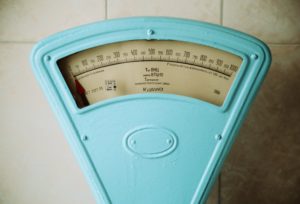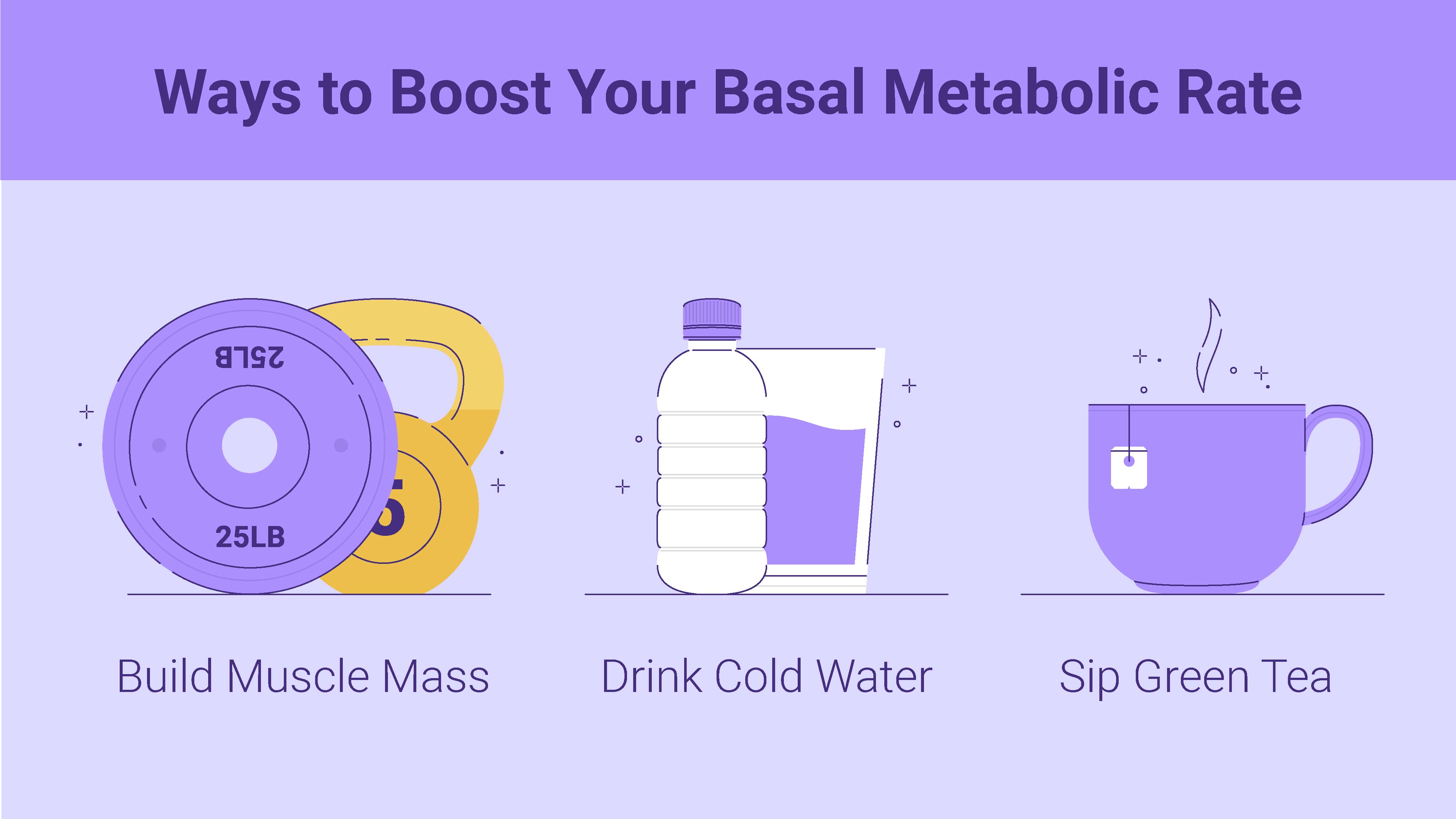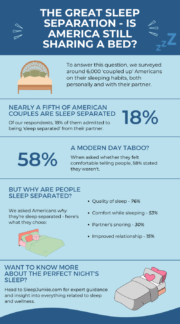How Many Calories Do You Burn Sleeping?
You don’t have to toss and turn in bed all night to burn calories while you sleep. Your body burns calories all day long, even when you rest. Breathing, pumping blood through your veins, and digesting food continue as you sleep. When your mind is getting much-needed rest, your body is hard at work and burning energy.
While it is impossible to know exactly how many calories your body burns while sleeping, you can use your basal metabolic rate to come up with an estimate. You can also take simple steps to boost your metabolic rate and burn more calories while at rest.
How Metabolism Works

Metabolism is a term which encompasses all of the chemical processes the body needs to function. Most people use the word to describe how the body turns calories from food into energy. This is more accurately described as the metabolic rate, not metabolism.
When you eat, food is transported to the stomach. There, digestive enzymes break proteins down into individual amino acids, convert carbohydrates into simple sugars, and turn fats into fatty acids. Amino acids, simple sugars, and fatty acids are the fuel your body needs to power through the day.
If there is an excess amount of these compounds, the body stores them in body fat, muscles, and the liver. Hormones from the endocrine system control our metabolic rate. The pancreas, in particular, plays a key role in regulating metabolic activity. It secretes the blood sugar-lowering hormone insulin and its opponent glucagon. These hormones tell your body how much glucose, or energy, to carry in the bloodstream. When glucose levels are increased, the result is higher blood sugar and weight gain.
How to Find Your Basal Metabolic Rate
Your basal metabolic rate, or BMR, is the rate at which your body burns calories while resting. It is sometimes referred to as the resting metabolic rate for this reason. When it comes to figuring out how many calories you burn while sleeping, this is the number you will need to find. By definition, the BMR is the energy your body uses while resting or sleeping.
There are many free BMR calculators available online. If you want to do the math yourself, use these equations.
BMR formula for men:
- 66 + (6.2 x weight in pounds) + (12.7 x height in inches) – (6.76 x age in years) = BMR
BMR formula for women:
- 655.1 + (4.35 x weight in pounds) + (4.7 x height in inches) – (4.7 x age in years) = BMR
With this simple equation, you now know how many calories you burn at rest during a 24-hour period.
For example, a 40-year-old man who is 5 feet, 10 inches tall and weighs 180 pounds has a BMR of 1,801 calories:
- 66 + (6.2 x 180) + (12.7 x 70) – (6.76 x 40) = 1800.6
A 30-year-old woman who is 5 feet, 4 inches tall and weighs 150 pounds has a BMR of 1,467 calories:
- 655.1 + (652.5 4.35 x 150) + (300.8 4.7 x 64) – (141 4.7 x 30) = 1467.4
To figure out how many calories you burn while sleeping, plug your BMR into the following equation:
- BMR/24 x number of hours you sleep each night
Your basal metabolic rate is only an approximation. Because BMR is an estimate, the number of calories you burn while sleeping is also an estimate. People who are taller and carry more bodyweight will have a higher resting metabolic rate than people who are short and thinner. This means a larger person burns more calories while sleeping and a smaller person burns fewer calories. Also, men burn more calories than women while resting because they have more muscle mass than women with the same weight.
Other Factors to Consider
If you suffer from insomnia, your resting metabolic rate may be lower than the estimate calculated above. Sleep deprivation increases the level of cortisol in the bloodstream. This is linked to an increase in appetite and a decrease in metabolic rate. Make sure you get an adequate amount of sleep for optimum metabolism.
Because hormones regulate your metabolism, many hormonal disorders slow your metabolic rate and cause you to gain weight. These include conditions like hypothyroidism and Cushing syndrome. On the other hand, hyperthyroidism has the opposite effect. It increases metabolic rate, meaning you will burn more calories in your sleep. If you have concerns about your hormone levels and their impact on your metabolism, talk to your doctor.
Ways to Boost Your Basal Metabolic Rate
There are some proven ways to increase your basal metabolic rate and help your body burn more calories while at rest.
Build Muscle Mass
Muscle burns more calories than fat. When it comes to increasing BMR, one of the most effective ways to achieve long-term results is to lose fat and gain muscle. With a higher percentage of muscle in the body, you burn more calories during sleep.
Eat More Protein
When you eat, your metabolism gets a temporary boost from the extra energy expended to digest and break down the food you’ve eaten. Protein requires more calories to digest than fat and carbs, increasing your metabolic rate by 15-30%.
Drink Cold Water
Another temporary way to increase metabolic rate is drinking cold water. This is a phenomenon called water thermogenesis. Drinking a half-liter of water increases your BMR by 10-30% for about an hour afterward.
Participate in High Intensity Workouts
We know exercise is a tried-and-true way to boost metabolism, but High-Intensity Interval Training (HIIT) seems to be particularly effective. This is good news for anyone with a busy schedule. It means you don’t have to spend long periods of time at the gym for a calorie-burning workout with sustained benefits for your resting metabolic rate.
Sip Green Tea
Caffeine in all forms –– coffee, chocolate, and tea –– can temporarily increase your basal metabolic rate. Since this article is about sleep, we don’t recommend loading up on caffeine before bedtime to burn extra calories. Instead, try switching your morning cup of coffee with green tea. Green tea increases metabolism not only via caffeine, but also by converting body fat into free fatty acids, which supports weight loss.
Move More
If you lead a sedentary lifestyle or have a job which requires long periods of sitting or standing, make an effort to get up and move throughout the day. Even taking short breaks to walk around your home or office to increase your physical activity can make a difference.

How Sleep Supports Weight Loss
Getting a good night’s sleep can support your overall fitness goals. As discussed above, losing body fat and gaining muscle is an effective, science-backed way to boost your basal metabolic rate. Sleep can help you lose weight in the following ways:
- Getting enough hours of sleep each night gives you the energy you need to be active.
- Sleep deprivation signals to the body it should store fat rather than burning it.
- You perform your best after getting restorative, deep sleep. Good performance means better calorie burn.
- People who are well-rested burn 20% more calories while sleeping than people who suffer from chronic sleep deprivation.
- Good sleep supports the body’s ability to process insulin.
- When you’re well-rested, you have fewer cravings and make better decisions about food. Sleep deprivation triggers the release of ghrelin and leptin. These hunger hormones make us want to eat and lead to weight gain.
So, How Many Calories Do You Burn Sleeping?
You don’t burn more calories during sleep than you do during exercise or other activities. For this reason, determining how much energy you expend during sleep is as simple as figuring out your resting metabolic rate, or energy expenditure while at rest.
Once you have this number, divide it by 24 to get the number of calories you burn in an hour of sleep. Multiply this number by how many hours you sleep each night. This gives you a rough estimate of how many calories you burn while sleeping.
If you want to burn more calories while resting, there are research-backed ways to increase your basal metabolic rate. These include strength training, high-intensity workouts, and eating more protein. Getting enough sleep each night also supports metabolism.
Sleep may not burn as many calories as a rigorous cardio workout, but it plays a vital role in helping you maintain a healthy weight.



Comments are closed.